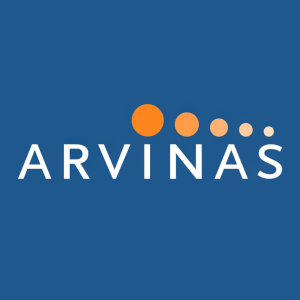Arvinas Presents Preclinical Data for PROTAC BCL6 Degrader, ARV-393, at the European Hematology Association 2025 Congress
Rhea-AI Summary
Positive
- Significant single-agent activity demonstrated in multiple lymphoma models
- ≥95% tumor growth inhibition achieved in transformed follicular lymphoma models
- Successful combinations with 5 classes of small molecule inhibitors showing enhanced antitumor activity
- Phase 1 clinical trial already enrolling patients
Negative
- Only preclinical data available so far
- Clinical efficacy in humans yet to be demonstrated
News Market Reaction 1 Alert
On the day this news was published, ARVN declined 2.38%, reflecting a moderate negative market reaction.
Data tracked by StockTitan Argus on the day of publication.
– ARV-393 demonstrated significant single-agent activity in models of nodal T-follicular helper cell lymphoma, angioimmunoblastic-type (also known as AITL) and transformed follicular lymphoma –
– In combination with small molecule inhibitors, ARV-393 demonstrated enhanced tumor growth inhibition, including tumor regressions, in models of aggressive diffuse large B-cell lymphoma (DLBCL) –
NEW HAVEN, Conn., June 13, 2025 (GLOBE NEWSWIRE) -- Arvinas, Inc. (Nasdaq: ARVN), a clinical-stage biotechnology company working to develop a new class of drugs based on targeted protein degradation, today presented data from preclinical studies of ARV-393, the company’s investigational PROteolysis TArgeting Chimera (PROTAC) B-cell lymphoma 6 protein (BCL6) degrader. BCL6 is a transcriptional repressor protein and a known driver of B-cell lymphomas. ARV-393 demonstrated significant single-agent activity in a patient derived xenograft (PDX) model of nodal T-follicular helper cell lymphoma, angioimmunoblastic-type (nTFHL-AI also known as AITL) and PDX models of transformed follicular lymphoma (tFL). In combination with oral small molecule inhibitors (SMIs), ARV-393 demonstrated enhanced antitumor activity, including tumor regressions, in cell line-derived xenograft (CDX) models of high-grade B-cell lymphoma (HGBCL) and aggressive diffuse large B-cell lymphoma (DLBCL). The results from these preclinical studies were shared at the European Hematology Association (EHA) 2025 Congress in Milan, Italy.
Key findings from the preclinical studies included:
- Single-agent ARV-393 significantly reduced tumor burden in peripheral blood, bone marrow and spleen in a systemic PDX model of nTFHL-AI derived from a patient who relapsed post chemotherapy. This is potentially the first preclinical evidence of anti-tumor activity with an efficacious BCL6-targeted small-molecule degrader in a human nTFHL-AI model.
- ARV-393 monotherapy treatment resulted in robust (≥
95% ) tumor growth inhibition (TGI) in two PDX models of tFL. - ARV-393 in combination with 5 classes of SMIs targeting potentially cooperative oncogenic drivers (tazemetostat, palbociclib, everolimus, acalabrutinib, or venetoclax) demonstrated increased TGI in CDX models of HGBCL and aggressive DLBCL compared with the respective monotherapy treatments. Tumor regressions were observed when ARV-393 was combined with tazemetostat, palbociclib, acalabrutinib, or venetoclax.
- RNA sequencing studies carried out to further characterize downstream mechanism of action suggested that ARV-393 inhibits tumor cell cycle progression and promotes differentiation, driving antitumor activity and broad combinability in preclinical models.
“We are encouraged by the marked single-agent activity of ARV-393 in PDX models of AITL and transformed follicular lymphoma and by the enhanced antitumor activity of ARV-393 in combination with five classes of small molecule inhibitors in models of aggressive DLBCL,” said Noah Berkowitz, M.D., Ph.D., Chief Medical Officer at Arvinas. “We believe these preclinical data potentially suggest the broad utility of ARV-393 across non-Hodgkin lymphoma subtypes with unmet need beyond DLBCL and provide a compelling rationale for considering combination strategies including chemotherapy-free approaches as we work to bring forward new therapeutic options for adult patients with lymphoma.”
A Phase 1 study of ARV-393 is enrolling adult patients with relapsed/refractory non-Hodgkin lymphoma, including DLBCL and nTFHL-Al (AITL) (NCT06393738).
Additional detail on the ARV-393 data presentation at the EHA 2025 Congress:
Poster Title: ARV-393, a PROteolysis TArgeting Chimera (PROTAC) BCL6 Degrader, is Efficacious in Preclinical Models of Diffuse Large B-Cell Lymphoma, Nodal T-Follicular Helper Cell Lymphoma, and Transformed Follicular Lymphoma
Abstract: PF1000
Session Title: Lymphoma biology & translational research
Date: Thursday, June 13, 2025
Time: 6:30-7:30 pm CEST
About ARV-393
ARV-393 is an investigational orally bioavailable PROteolysis TArgeting Chimera (PROTAC) designed to degrade B-cell lymphoma 6 protein (BCL6), a transcriptional repressor and major driver of B-cell lymphomas. The BCL6 protein facilitates B cell tolerance of rapid proliferation and somatic gene recombination via repressing cell cycle checkpoints, terminal differentiation, apoptosis, and the DNA damage response. PROTAC-mediated degradation has the potential to address the traditional undruggable nature of BCL6. ARV-393 is currently being evaluated in a Phase 1 clinical trial in patients with relapsed/refractory non-Hodgkin lymphoma.
About Arvinas
Arvinas (Nasdaq: ARVN) is a clinical-stage biotechnology company dedicated to improving the lives of patients suffering from debilitating and life-threatening diseases. Through its PROTAC protein degrader platform, Arvinas is pioneering the development of protein degradation therapies designed to harness the body’s natural protein disposal system to selectively and efficiently degrade and remove disease-causing proteins. Arvinas is currently progressing multiple investigational drugs through clinical development programs, including vepdegestrant, targeting the estrogen receptor for patients with locally advanced or metastatic ER+/HER2- breast cancer; ARV-393, targeting BCL6 for relapsed/refractory non-Hodgkin lymphoma; ARV-102, targeting LRRK2 for neurodegenerative disorders; and ARV-806, targeting KRAS G12D for mutated cancers, including pancreatic and colorectal cancers. Arvinas is headquartered in New Haven, Connecticut. For more information about Arvinas, visit www.arvinas.com and connect on LinkedIn and X.
Forward-Looking Statements
This press release contains forward-looking statements within the meaning of The Private Securities Litigation Reform Act of 1995 that involve substantial risks and uncertainties, including statements regarding: whether this data shows the first preclinical evidence of anti-tumor activity with an efficacious B-cell lymphoma 6 protein-targeted small-molecule degrader in a human nodal T-follicular helper cell lymphoma, angioimmunoblastic-type model; whether ARV-393 inhibits tumor cell cycle progression and promotes differentiation, driving antitumor activity and broad combinability in preclinical models; that ARV-393 preclinical data potentially suggest the broad utility of ARV-393 across non-Hodgkin lymphoma subtypes with unmet need beyond diffuse large B-cell lymphoma; that ARV-393 preclinical data provide a compelling rationale for considering combination strategies including chemotherapy-free approaches; and whether Arvinas will bring forward new therapeutic options for adult patients with lymphoma and the timing thereof. All statements, other than statements of historical fact, contained in this press release, including statements regarding Arvinas’ strategy, future operations, future financial position, future revenues, projected costs, prospects, plans and objectives of management, are forward-looking statements. The words “anticipate,” “believe,” “estimate,” “expect,” “intend,” “may,” “plan,” “target,” “goal,” “potential,” “will,” “would,” “could,” “should,” “look forward,” “continue,” and similar expressions are intended to identify forward-looking statements, although not all forward-looking statements contain these identifying words.
Arvinas may not actually achieve the plans, intentions or expectations disclosed in these forward-looking statements, and you should not place undue reliance on such forward-looking statements. Actual results or events could differ materially from the plans, intentions and expectations disclosed in the forward-looking statements Arvinas makes as a result of various risks and uncertainties, including but not limited to: whether Arvinas will be able to successfully conduct and complete development for ARV-393 and its other product candidates; other risks associated with drug development, including unexpected costs or delays; that positive data from preclinical or early clinical studies of Arvinas’ product candidates are not necessarily predictive of the results of later clinical studies and any future clinical trials of Arvinas’ product candidates; Arvinas’ ability to protect its intellectual property portfolio; Arvinas’ reliance on third parties; whether Arvinas will be able to raise capital when needed; whether Arvinas’ cash and cash equivalents will be sufficient to fund its foreseeable and unforeseeable operating expenses and capital expenditure requirements; and other important factors discussed in the “Risk Factors” section of Arvinas’ Annual Report on Form 10-K for the year ended December 31, 2024 and subsequent other reports on file with the U.S. Securities and Exchange Commission. The forward-looking statements contained in this press release reflect Arvinas’ current views with respect to future events, and Arvinas assumes no obligation to update any forward-looking statements, except as required by applicable law. These forward-looking statements should not be relied upon as representing Arvinas’ views as of any date subsequent to the date of this release.
Contacts:
Investors:
Jeff Boyle
+1 (347) 247-5089
Jeff.Boyle@arvinas.com
Media:
Kirsten Owens
+1 (203) 584-0307
Kirsten.Owens@arvinas.com








